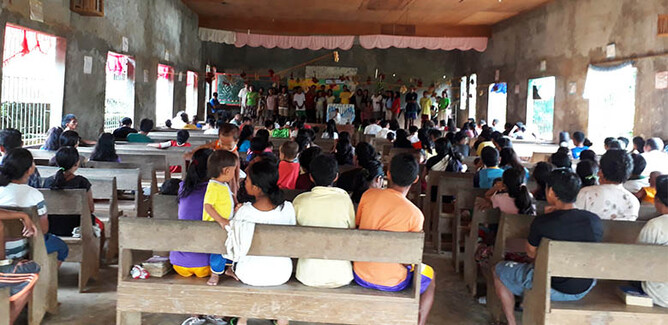It was just another morning in Safa, a village of a few hundred people built on the side of one of the countless river valleys that crisscross this particular part of the rural Philippines. I woke to the sound of the church bell – a rusty old caterpillar tread that hangs outside the church building – ringing seven times. I blearily put my mosquito net away, gulped down a cup of coffee, and along with about a hundred other people, turned up to the morning church service to sing some hymns and listen to the morning sermon.
By the way, it was a Wednesday morning, not a Sunday. In Safa, church services run 14 times a week, morning and evening. Almost everyone in the village attends at least some of the services, and there’s a large core group who you can expect to see there, day after day after day. Visitors to our area are often impressed with the obvious devotion of the people of Safa – and rightly so. What visitors don’t realise, however, is that what is being taught in the Safa church is often very different to what one would expect of a church planted by evangelical missionaries.
Case in point: on this particular Wednesday morning, the speaker told us that we had to save ourselves through our own effort. “It’s our job,” he said, “not God’s job. We’re the ones who go to church every day. So we can be certain that God has no part in saving us. We are the ones who have to save ourselves.” Messages like this are not unusual in the Safa church – preachers here frequently tell the congregation that God only accepts us if we try hard enough.
It may seem hard to understand how this can happen in a church where people believe that the Bible is God’s Word. Haven’t they read Ephesians 2:8-9? “God saved you by his special favor when you believed. And you can’t take credit for this; it is a gift from God. Salvation is not a reward for the good things we have done, so none of us can boast about it.” (NLT)
Actually, they have read it. On that Wednesday morning when the preacher told us that God has no part in saving us, the Biblical text that he was ‘explaining’ was Ephesians 2:8-9! The problem isn’t that the people of Safa aren’t interested in the message of the Bible – quite the opposite. The problem is that the people of Safa, like millions of other people around the world, don’t have access to a Bible translation that communicates this message in a way that they can really understand.
For the people of Safa, there’s hope that this will change. There’s a translation team – which includes yours truly – that’s working on translating the Bible into the language of the people of Safa. We actually started work on Galatians around the same time as the Wednesday sermon that I’ve been telling you about. But for many other people throughout the Philippines – and the rest of the world – there is no translation they can truly understand, and there is no translation team working on producing one.
If you don’t like the sound of this – if you don’t like the idea of people from marginalised minority groups the world over missing out on a chance to hear God’s message clearly – then I’d encourage you to think about how you could use your life to advance the cause of Bible translation.
Story and Images By
Hannah
(Day 5 DPG)
II you would like to know more about how you can become more involved and connected with the world of Mission, then give Sefton or Russell at GC3 a call. They would love to journey with you as you seek to find your place of service.
Phone: +64 6 357 8388
Email: admin@gc3.org.nz

